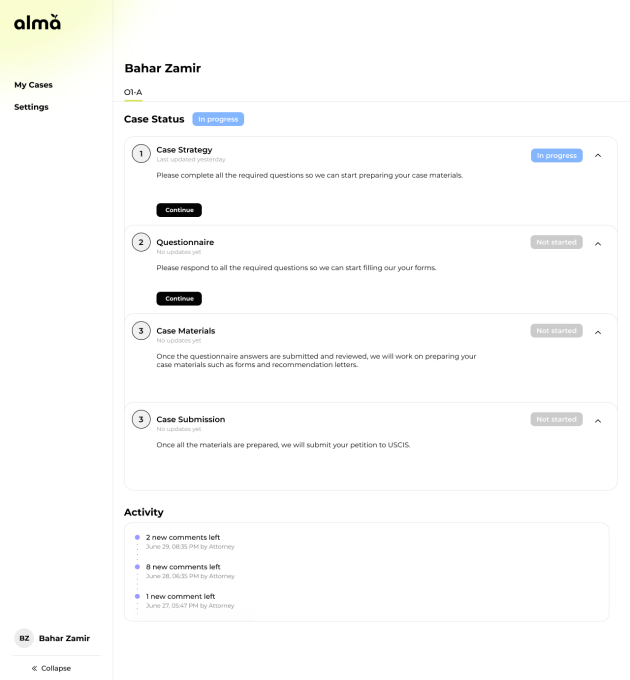Alma co-founder had such a bad immigration experience she founded a legal AI startup to fix it
When Aizada Marat moved from New York to California in 2018 with her husband, KODIF co-founder and CEO Chyngyz Dzhumanazarov, she needed to sort out her immigration status. That’s when everything started going badly.
The Kyrgyzstan-born, Harvard-educated attorney came to the U.S. when she was 17 for an exchange year with FLEX (future leaders exchange) sponsored by the U.S. State Department.
After graduating from Harvard, Marat moved to London because of immigration issues. Now she was coming out to California with Dzhumanazarov, who had been admitted to Stanford Business School, and to take a job offer at leading law firm Cooley.
But she didn’t realize that immigration lawyers can be very buyer-beware. Through a Google search she found a lawyer in Palo Alto to help her with her visa. That turned out to be a bad move. Marat said the lawyer gave her wrong advice about when she could file authorization to work in California. That mistake caused her to not be able to work for more than a year. She also could not leave the country.
“I’m a lawyer, so I listen to what lawyers say,” Marat told TechCrunch. “Unfortunately, listening to them was devastating because months later, I was still unable to work. I had a job offer from Cooley.”
Marat did end up getting to work at Cooley for three years. And she went back to that immigration law firm and showed them the mistake they made with her. It also ignited an entrepreneurial fire in her.
After she left Cooley to work at McKinsey as a management consultant, Marat kept coming back to that horrible immigration experience. So much so that she started thinking about why immigration legal services were of poorer quality given the long and complicated immigration process.

She learned that immigration law is “super fragmented,” meaning that 10% of the market is owned by one law firm while the other 90% is shared among over 20,000 law firms.
“Very few big law firms have immigration services today because it is mainly serving individuals, and those are small checks,” Marat said. “That’s why, to get a talent visa green card, the majority of the time, people can self-petition. They don't even need an employer. Cooley, in my case, wouldn't really sponsor visas, so I had to sort it out myself.”
And when she thought about what to do about it, Marat set out to start her own company developing software to sell to immigration attorneys. The goal was to help them deliver better services, so what happened to Marat wouldn’t happen again.
After four or five months of selling that software to five immigration law firms, Marat and her team made the decision to provide immigration services directly. In October 2023, they launched Alma, an AI-powered legal tech startup that she started with other immigrants, including former Uber engineering manager Shuo Chen and former Step product manager Assel Tuleubayeva.
The startup aims to simplify the visa process for technologists, founders and researchers by providing personal legal advisors, helping to speed up document processing and digitally organizing the entire process. And like other companies working in this area, including Migrun, Boundless and Lawfully, Alma wants to fast-track international talent into America's tech ecosystem, Marat said.
Marat says Alma differs from some competitors by leverage proprietary technology to provide high-quality services faster and employing its own immigration attorney.
“Immigrants deserve high-quality services because so much depends on the immigration attorney that you find,” Marat said. “All the repetitive and mundane things that lawyers hate, we can automate so that lawyers actually focus on all clients and provide a really good strategy to get higher approval rates.”
Helping to move the company forward is $5.1 million in combined seed and pre-seed funding that Alma recently raised. The company is backed by Bling Capital, Forerunner, Village Global, NFX, Conviction, MVP, NEA and Silkroad Innovation Hub. Much of the funding will go toward new hires for product and technology development.
